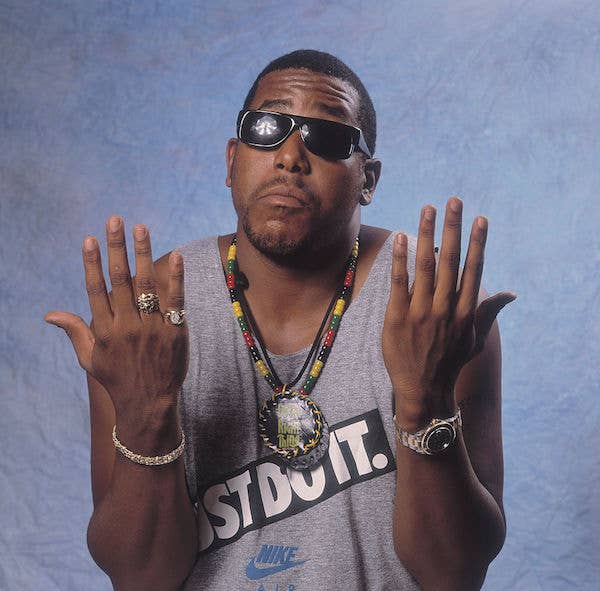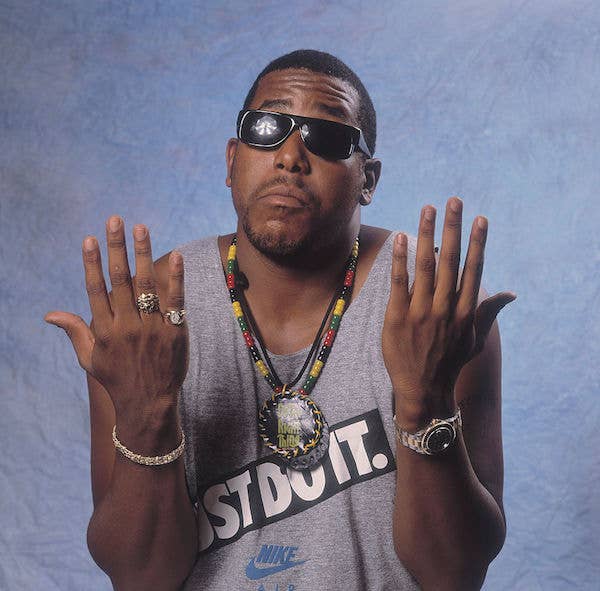
Last Tuesday, the hip-hop world took another blow when it was announced that Delicious Vinyl co-founder Matt Dike had passed away several weeks earlier. In the wake of the news, there was a renewed focus on Dike's wild life (his friendship with Basquiat; his work on the seminal Beastie Boys album Paul's Boutique, which was largely recorded in his apartment; and his retreat from the music business and public life in the early 1990s).
Equally as important as all those stories, though, is the legacy—still ongoing—of the record label Dike co-founded in 1987. Delicious Vinyl was instrumental in bringing hip-hop to a new audience, and responsible for giving a big break to arguably the greatest producer of all time.
The label was formed in 1987 by Dike and his friend Mike Ross. At the time, the two were young DJs who loved soul, funk, and rap, and discovering they had a lot in common.
"They were the only two white deejays in this record pool down on Crenshaw in 1982," Mike's brother Rick told The Find. "They kind of gravitated towards each other because they had the same tastes; they were both looking for the hottest hip-hop beats out of New York."
Matt and Mike decided they wanted to move from DJing and throwing parties into making beats and releasing records, so with help from their friend Mario, they set up a home studio and started cranking out tracks. They had some early local success with Anthony Smith, a sandpaper-voiced local kid who was affiliated with the Rolling 60 Crips, whose first couple songs got some burn on KDAY, an influential L.A. radio station. Next, they discovered a USC graduate named Marvin Young, and a Cuban rapper who went by Mellow Man Ace.
Ace was promising enough that Delicious was able to sell his in-progress debut album to Capitol Records, which helped the label gain some financial footing. By the middle of 1988, they had formed a partnership with Island Records. And the first single of the new deal? Well, there was a song written mostly by Young and rapped by Smith, that was inspired by a line from Spike Lee's She's Gotta Have It.
"Look, baby," said Fab 5 Freddy's character to Nola Darling (played by Tracy Camilla Johns). "Let's go to my house right now. Let's do the wild thing."
The song "Wild Thing," which featured Smith under his rap name, Tone-Lōc, became a massive hit, buoyed by its Robert Palmer-parodying video (shot by Tamra Davis, featuring a cameo by Johns, and with a budget of around $400). Young moved from songwriter to artist under the name Young MC, and released the indelible single "Bust a Move."
Paul Stewart was working promotions at Delicious while all of this was going on. Stewart, who went on to discover and manage acts including the Pharcyde (more on them later) and Coolio, says it is impossible to overestimate the impact of those two singles in spreading rap to a mass audience.
"I think it was almost unmeasurable how huge it was—not to L.A., but to the genre," he says. "The genre was so new in so many ways and it had never had kind of the music like Delicious had put out. They were making it commercial, but it had all these cool underground elements."
The reason "Wild Thing" in particular worked so well is that it had just enough rock and roll (mostly via the smart use of a sample from a Van Halen song) to get airplay on rock radio stations. Between that and Lōc's charming, self-effacing performance in the video, the song became a smash. And Young MC's smart, PG-13 rated Slick Rick-esque storytelling was perfect for adults and kids alike.
Delicious Vinyl went on to release well-received projects from Def Jef and Body and Soul, but that was only a prelude. In 1991, Stewart was at a convention and discovered a group of young dancers-turned-rappers with incredible charisma and a wildly funny rap about ya mama. He was determined to get the Pharcyde a record deal and, after being turned down by Def Jam, went to his old friends at Delicious.
In a 2017 interview, the group's Slimkid3 recalled why he was excited to sign to the label, and it was exactly because of the company's initial rush of crossover success.
"They just had the right thing," he remembered. "With Tone-Lōc's success and Young MC’s success, they had an edge. It was palatable. To look at it, it reached out to pop culture."
The Pharcyde's debut album Bizarre Ride II the Pharcyde, which naturally included "Ya Mama," was a classic. But their follow-up, Labcabincalifornia, would be even more important.
The group went out to New York with hopes of working with Q-Tip. He was busy with Mobb Deep, but he played them beats by a young friend of his, Jay Dee. In that batch of music was the track that would eventually become "Runnin'." Jay Dee, or Dilla—a nickname he also used—produced or co-produced half a dozen songs on the album, and a handful of remixes to boot. The Pharcyde gave Dilla some of his first major production credits, launching one of rap's most storied careers.
In that same era, the label also found success with the Brand New Heavies and gave Masta Ace a mid-career reinvention. They're still active today, having put out music in recent years from Dom Kennedy, Casey Veggies, and Dilla's brother Illa J.
To Stewart, Delicious Vinyl's legacy stands especially strong in its hometown of Los Angeles. The label, he says, was the first one in the city "where people who worked there were actually part of the culture," and almost every major rap personality in L.A. not related to NWA can be traced back to Dike, Ross, and company. The label's early find Mellow Man Ace was the brother of Cypress Hill's Sen Dog, and Stewart himself discovered House of Pain and Warren G, among many others.
"If you consider people like me and Orlando [Aguillen] and Leslie Cooney, there were a lot of people from Delicious who were there for some time with all those tentacles [into the L.A. scene]," Stewart reflects. "Mike and Matt did have a lot of connections with a lot of artists too that weren’t even signed to the label. Things that weren’t Macola, N.W.A.-like gangster things would often be through them, or affiliated to them."
Without Delicious Vinyl's perfect balance of underground aesthetics and commercial appeal, of rock guitars and funk grooves, of ya mama jokes and morality tales, hip-hop might not have traveled quite as far, and certainly not as quickly. Matt Dike may no longer be around, but the legacy he and Mike built is still relevant—and might be the reason you’re listening to rap at all.



